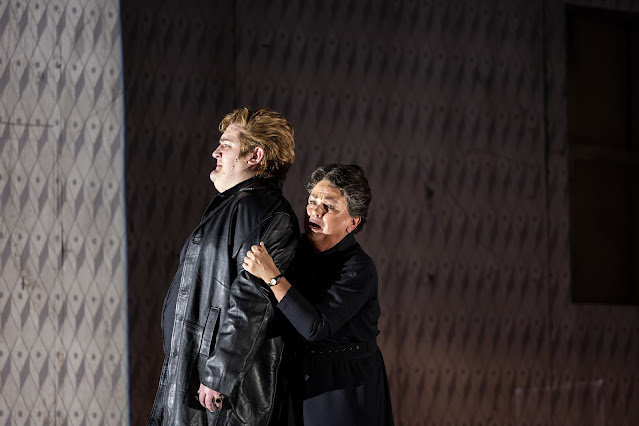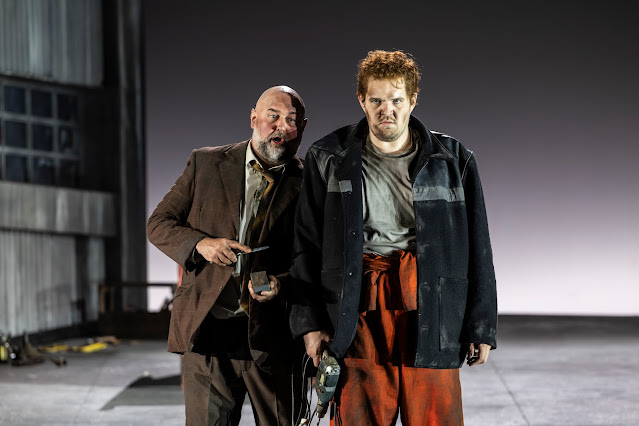.jpg) |
| Janáček:Jenůfa, Act 3 - Jennifer Davis - English National Opera, 2024 (Photo: © Ellie Kurttz) |
Janáček: Jenůfa; Jennifer Davis, Susan Bullock, Richard Trey Smagur, John Findon, Fiona Kimm, director: David Alden, conductor: Keri-Lynn Wilson; English National Opera at the London Coliseum
Reviewed 13 March 2024
A vivid account of tis hard-edged, expressionist production showcasing intense and profound performances from the principals
David Alden's production of Janáček's Jenůfa at English National Opera debuted in 2006 and was last seen at the London Coliseum in 2016 [see my review]. The latest revival of the production is the last fully-staged opera ENO performs this season (two semi-staged performances of Bartok's Bluebeard's Castle are to come), a significant moment when a large amount of 'who knows' seems to hang over the whole enterprise. But this revival, directed by David Alden, with movement director Maxine Braham, seemed to be a stake in the sand, showing what ENO does best. Conducted by Keri-Lynn Wilson, the cast included Jennifer Davis as Jenůfa, Susan Bullock as the Kostelnička, Richard Trey Smagur as Laca, John Findon as Števa and Fiona Kimm as Grandmother Burya. Set designs are by Charles Edwards with costumes by Jon Morrell, lighting by Adam Silverman revived by Gary James. The work was sung in the classic Edward Downes and Otakar Kraus translation.
Jennifer Davis, who sang Jenůfa, is a singer who impressed in the title role of Dvořák's Armida at Wexford in 2022 [see my review]. Armida premiered in 1904 in Prague, just three months after the first performance of Jenůfa in Brno. Janáček was only 13 years younger than Dvořák yet the dramatic approaches of the two operas are worlds apart, the one looking backward and the other looking presciently forward.
 |
| Janáček:Jenůfa, Act 1 - Fiona Kimm, Julieth Lozano Rolong, Jennifer Davis - English National Opera, 2024 (Photo: © Ellie Kurttz) |
Alden's production transposes the action to a rather grim 1950's Eastern bloc factory. Charles Edwards' designs are neatly observed and Alden fills the stage in Act One with much action, including the sense that many of the men lust after Jenůfa including Darren Jeffery's foreman who clutched his crotch rather a lot. Alden resolutely avoided any sense of the folkloric; the dancing in Act One was little more than drunken celebration, whilst in Act Three the girls' dance was a sort of embarrassed feature of the wedding, their traditional costumes accessorised with leather jackets and such.
Alden seemed to be interested in creating a world of broken people, almost grotesques, against which Jennifer Davis' self-contained Jenůfa came across as the only normal person, so the villagers and mill-hands were profoundly unlikeable. So much so, that when Susan Bullock's severe Kostelnička appeared to interrupt the celebrations, rather than being a killjoy you rather sympathised with her.
Alden doesn't invent things, the whole production was based on the disturbing vein of violence and anger that simmers under the opera's surface. Act One is the most conventional, the closest to Verismo models, but the subsequent acts are unremitting in their focus on the disturbing elements in the drama. Act Two essentially takes us into the Kostelnička's head, and here the set was a simple, stark room of extreme geometry with strong shadows heightening the expressionist element.
That said, I did find that Act One in particular had a rather unpleasantly hard edge to it. The ENO chorus and ensemble acted their socks off, so this was brilliantly done but you wished for a little relaxation, a little folklore in the mix. Surely the idea of Janáček's opera is to set the emotional traumas of the Burya family against the routine of everyday life.
 |
| Janáček:Jenůfa, Act 2 - John Findon, Susan Bullock - English National Opera, 2024 (Photo: © Ellie Kurttz) |
Jennifer Davis' impressively contained yet strong performance as Jenůfa stood out, the only bastion of normality in this world. Yet Jenůfa was, to a certain extent, deluded in her regard for John Findon's unpleasantly slob-ish and entitled Števa. Davis has quite a big dramatic voice, which meant that she was able to give full reign to the emotional drama in the role. In Act One things simmered under the surface, perhaps a bit too contained, but in Act Two everything exploded and you forgave Alden everything for the way he and Davis created a scene of such searing intensity. Here Davis' voice let rip, but always within the role, there was never a feeling of a big voice being reined in. In Act Three the containment returned, a little, but also Davis suggested that the girl had inherited some of her stepmother's iron control. The end, when it came was simply glorious. But Davis and Richard Trey Smagur leaned into Janáček's wonderful climax, two damaged characters finally finding each other. And for once, in a modernist style production, there was no hint of subverting the opera's message, but with that music coming out of the pit, how could you.
Susan Bullock made the Kostelnička's control and discipline a physical thing, her body language said it all. Yet within this iron control there was a vein of emotionalism that came out in Bullock's voice, the rich colours and warm timbres. Bullock's fine diction meant that words really counted here. She got her Act One solo which is usually cut because it holds things up, but Bullock's intelligent performance made it worthwhile. In Act Two she really leaned in to the expressionist nature of the production, and the sheer violence of her emotional reaction to events was shocking. By Act Three, this woman is broken, yet still in control enough at the end, with no hint of redemption in this production.
 |
| Janáček:Jenůfa, Act 1 - Darren Jeffery, Richard Trey Smagur - English National Opera, 2024 (Photo: © Ellie Kurttz) |
American tenor Richard Trey Smagur, making his UK opera house and role debut, brought great physicality to the role of Laca. Smagur is a big man, and he made Laca physically ungainly, a mirror of the way he had difficulty keeping his emotions in check, and the one led to the other, hence the incident with the knife. There was no doubting the intensity of this Laca's feelings, Smagur has a big, vibrant voice which seemed to want to lean into a bigger role at times. I don't know whether it was intentional or not, but by the opera I could not help feeling that the way the role was being played hinted that this Laca had mental health issues, which left something of a nasty taste in the mouth. But Smagur's radiant performance at the end, conquered all.
John Findon had a whale of a time as bad-boy Števa, entitled and irredeemably self-regarding, Findon's rather over-the-top antics fitted admirably into Alden's distorted world, whilst Findon's singing in Act One rightly held focus, this Števa knew how to be liked. In Act Two, Findon gave us a sight of the weak man underneath, unable to deal with Jenůfa's pregnancy, and unable to deal with the Kostelnička's fierceness.
Fiona Kimm made grandmother something of a control freak in Act One, yet with a sense of a crazy old woman lurking underneath. Her fondness for Števa here seemed almost wilful blindness, whilst in Act Three the woman was clearly meant to be on a decline into sad senility.
The smaller roles were all vividly taken, each creating a strong character. Julieth Lozano Rolong, making her company debut, brought vivid tone and irrepressible enthusiasm to Jano. Darren Jeffery was the mill foreman, frequently an observer to the action in Act One, creating a feeling of his underlying contempt for his employers. Freddie Tong made self-regarding and rather unpleasant Mayor, with Madeleine Shaw channelling Hyacinth Bucket as his wife. Isabelle Peters sang and danced engagingly as Barena. Segomotso Masego Shupinyaneng was all self-regarding charm and simpering as their daughter, Karolka. Morag Boyle and Claire Pendleton completed the cast with brilliant cameos as a neighbour and a villager.
The chorus was on terrific form (belying the alarums and excursions that have been going on behind the scenes), not only singing up a storm but creating a whole world of vivid and disturbing characters. Everything in Act One seemed to have a threat of violence, to be a whisker away from real danger and then in Act Three the chorus' entry through the house itself was appropriately terrifying.
Conductor Keri-Lynn Wilson drew her cast into strongly performed ensemble, with a sure feel for the pacing of Janáček's often speech-based music. In the pit, the orchestra made the music seem gorgeous, too much so at times and in Act One particularly, I would have liked a bit more edge. This came in Act Two, and the conclusion to Act Three was simply magical.
.jpg) |
| Janáček:Jenůfa, Act 3 - Jennifer Davis, Isabelle Peters, Fiona Kimm - English National Opera, 2024 (Photo: © Ellie Kurttz) |
This was a strong evening in the theatre, anchored by powerful performances particularly from Jennifer Davis as Jenůfa and Susan Bullock as the Kostelnička. As a performance of David Alden's production, this could not be bettered, creating an almost expressionist nightmare out of Janáček's drama.
Never miss out on future posts by following us
The blog is free, but I'd be delighted if you were to show your appreciation by buying me a coffee.
Elsewhere on this blog
- Little short of a revelation: Michael Spyres, Les Talens Lyriques & Christophe Rousset explore Wagner's influences with In the Shadows - record review
- Upheaval: cellist Janne Fredens & pianist Søren Rastogi in music by four women composers from the years 1911 to 1918 - record review
- Something astonishing: Olivia Fuchs' new production of Britten's Death in Venice for Welsh National Opera involved a collaboration with circus arts, NoFit State - opera review
- Lumen Christi: I chat to Master of Music, Simon Johnson about his first disc with the choir of Westminster Cathedral - interview
- Szymanowski's rarely performed Harnasie from the LPO, with a visual installation from Wayne McGregor & Ben Cullen Williams - concert review
- Danza Gaya: Simon Callaghan & Hiroaki Takenouchi play with wonderful élan & relish, clearly having a great deal of fun - record review
- Ian Venables' intense settings of John Clare at the centre of the Dante Quartet's Conway Hall concert alongside Gurney and Elgar - concert review
- Six Concerts avec plusieurs instruments: London Handel Players at Wigmore Hall - concert review
- Musical strengths, visual confusion & two Rakes: English Touring Opera's new production of Stravinsky's The Rake's Progress - opera review
- Shamus O'Brien: withdrawn by the composer for political reasons, Stanford's most popular opera languished in the 20th century but all that seems set to change - interview
- Home











No comments:
Post a Comment